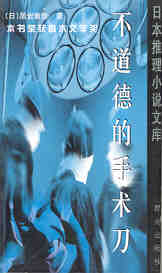04道德经英译本85种-第413部分
按键盘上方向键 ← 或 → 可快速上下翻页,按键盘上的 Enter 键可回到本书目录页,按键盘上方向键 ↑ 可回到本页顶部!
————未阅读完?加入书签已便下次继续阅读!
Any height of power is always followed by decadence。 Making oneself is therefore contrary to the Principle (the source of duration)。 He who is lacking on this point; will not be long in coming to an end。
31
The best weapons are ill…omened instruments that all beings hold in fear。 Therefore those who conform themselves to the Principle do not use them。
In times of peace; the prince puts the civil minister he honours on his left (the place of honour); but even in times of war; he puts the military commander on his right (which is not the place of honour; even though he is exercising his function)。
Weapons are disastrous instruments。 A wise prince uses them only with reluctance and from necessity。 He prefers always a modest peace to a glorious victory。
No one should think that victory is a good thing。 He who thinks that; shows that he has the heart of an assassin。 Such a man would not be fit to reign over the empire。
According to the rites; those of good omen are placed on the left; those of ill…omen on the right。 (Now when the emperor receives two military officers together); the one of subordinate rank (who only acts on superior orders; and is therefore less ill…omened) is placed on the left。 The commanding officer is placed on the right; that is; in the first place according to the funeral rites; (the place of the chief mourner)。
For it behooves one who has killed many men to weep tears of lamentation for them。 The only place really fitting for a conquering general is that of the chief mourner (leading the mourning for those whose death he has caused)。
When; in the beginning; in this visible world; the Principle imparted itself in the production of (sentient) beings with names; it did not produce them in a way that exhausted itself (but only as tenuous prolongations; its mass remaining intact)。
32
The Principle has no name of its own。 It is nature。 This nature so unmanifest is stronger than anything。
If princes and emperors were to conform themselves to it; all beings would collaborate with them spontaneously;
heaven and earth would act in perfect harmony; sprinkling a sweet dew (the best possible omen); the people would be governable without the need for constraint。
The Principle is; with reference to the diversity of beings in the world; like the mass of great rivers and oceans with reference to trickles and rivulets of water。
33
Knowing others is wisdom; but knowing oneself is superior wisdom; (one's own nature being most hidden and profound)。
Imposing one's will on others is strength; but imposing it on oneself is superior strength (one's own passions being the most difficult to subdue)。
Being satisfied (content with what destiny has given); is true wealth; being master of oneself (bending oneself to the dispositions of destiny) is true character。
Staying in one's (natural) place (that which destiny has given); makes for a long lifer。 After death; not ceasing to be; is true longevity; (which is the lot of those who have lived in conformity with nature and destiny)。
34
The great Principle extends itself in all directions。
It lends itself willingly to the genesis of all beings (its participants)。 When a work is accomplished; it does not attribute it to itself。 It nourishes all beings with kindness; without imposing itself on them as a master (for having nourished them; leaving them free; not exacting any degrading return from them)。
Because of its constant disinterestedness; one might think it would become diminished。 This is not so。
All beings to who it is so liberal; run towards it。 It therefore finds itself magnified (through this universal trust)。
The Sage imitates this conduct。 He; also; makes himself small (through his disinterestedness and his delicate reserve); and acquires thereby true greatness。
35
Because he resembles the great prototype (the Principle; through his disinterested devotion); all come to the Sage。 He welcomes them all; does them good; and gives them rest; peace; and happiness。
Music and good cheer may hold up a passer…by for but a night; (since sensual pleasures are fleeting and leave nothing behind)。
Whereas the exposition of the great principle of disinterested devotion; simple and gentle; which charms neither the eyes nor the ears; pleases; engraves itself; and is of an inexhaustible fecundity in matters of practical application。
36
The beginning of contraction necessarily follows the maximum of expansion。 Weakness follows strength; decadence follows prosperity; depravation follows opulence。
This is a subtle insight (that many do not wish to see)。 All preceding strength and superiority is expiated by subsequent debility and inferiority。 More calls for less; excess calls for deficit。
A fish should not leave the depths (where it lives ignored but in security; in order to show itself at the surface where it could be harpooned)。 A state should not show its resources (if it does not wish the others to turn against it in order to crush it)。
37
The Principle is always non…acting (not acting actively); and yet it does everything (without seeming to participate)。
If the prince and the lords could govern like that (without poking their fingers in it); all beings would become spontaneously perfect (by returning to nature)。 It would only remain to call them back to unnamed nature (to the primordial simplicity of the Principle) each time they showed any tendency to come out of this state (by acting)。 In this state of unnamed nature there are no desires。
When there are no desires all is peaceful; and the state is governed by itself。
38
That which is superior to the Virtue of the Principle (the Principle itself; considered in its essence); does not act; but holds Virtue in a state of immanence within itself。 All those which are inferior to the Virtue of the Principle (artificial rules of conduct); are only a palliative for the loss of that Virtue; palliative with which it has nothing in common。
That which is superior to the Virtue (the Principle); does not act in detail。 (The artificial rules) which are inferior to the Virtue (of the Principle) only exist for action in detail。
When nature; with its good instincts; has been forgotten; artificial principles come as palliatives for this deficit。 These are; in descending order; goodness; fairness; rites and laws。 (Artificial Confucian goodness is superior to artificial fairness which; in struggling to cope with the diverse inclinations of men; has produced rites and laws)。
Rites are but a poor expedient to cover up the loss of original uprightness and frankness。 They are more a source of trouble (in etiquette and rubric) then they are of order。 The last term of this descending evolution; political wisdom (making laws); was the beginning of all abuses。
He who is truly a man; holds himself to uprightness and natural good sense。 He is contemptuous of artificial principles。 Using discernment; he rejects this (the false); in order to embrace that (the true)。
39
The following participate in primitive simplicity: Heaven; which owes its luminosity to its simplicity。 Earth; which owes its stability to it。 The universal generative action; which owes its activity to it。
The median space; which owes its fecundity to it。 The life common to all beings。 The power of the emperor and the princes。 (Life and power being emanations of the Principle)。 What makes them such as they are; is the (primitive) simplicity (in which they participate)。
If heaven came to lose it; it would fall。 If the earth came to lose it; it would lose its stability。 If the generative action lost it; it should cease to act;
If the median space lost it; all beings would disappear。 If the emperor and the princes should lose it; they would have no more dignity。
All elevation; all nobility; is based on abasement and simplicity (characteristics proper to the Principle)。
Therefore it is right that the emperor and the princes; the most exalted of men; should be designated by the terms sole; unique; incapable; without them being thereby degraded。
(Applying the same principle of simplicity in their government); they should reduce the multitude of their subjects to unity; considering them with the same serene impartiality as an undivided mass;
not regarding some as precious jade and others like base stones。
40
Going back (towards the Principle) is the type of movement characteristic of those who conform themselves to the Principle。 Attenuation is the result of their being conformed to the Principle。
Considering all that exists is born of simple being; and that being is born of formless non…being; they tend; in diminishing themselves without cease; to go back to primordial simplicity。
41
When a well…read person of high caliber hears about the return to the Principle; he applies himself to it with zeal。 A person of medium caliber applies himself to it indecisively。
An inferior person ridicules it。 That such a person should ridicule it; is a mark of the truth of this doctrine。 The fact that they do not understand it; shows its transcendence。
They say in the proverb: Those who have understood the Principle are as if blind; those who tend towards it are as if disoriented; those who have reached it seem like common people。 This is because great virtue hollows itself like a valley; the great light voluntarily dims itself; vast virtue seems defective; solid virtue seems incapable。
Therefore the Sage hides his qualities beneath a somewhat repulsive exterior。 He who goes by these appearances will be quite misled。 Like a square so big that its corners are invisible; like an enormous vase that is never finished; like a great meaning hidden in a feeble sound; like a great shape that cannot be grasped;
the Sage resembles the Principle。 … Now the Principle is latent and has no name; but through its gentle communication; everything is produced。 It is the same; in proportion; for the Sage。
42
When the Principle has emitted its virtue; the latter begins to evolve according to two alternating modali





